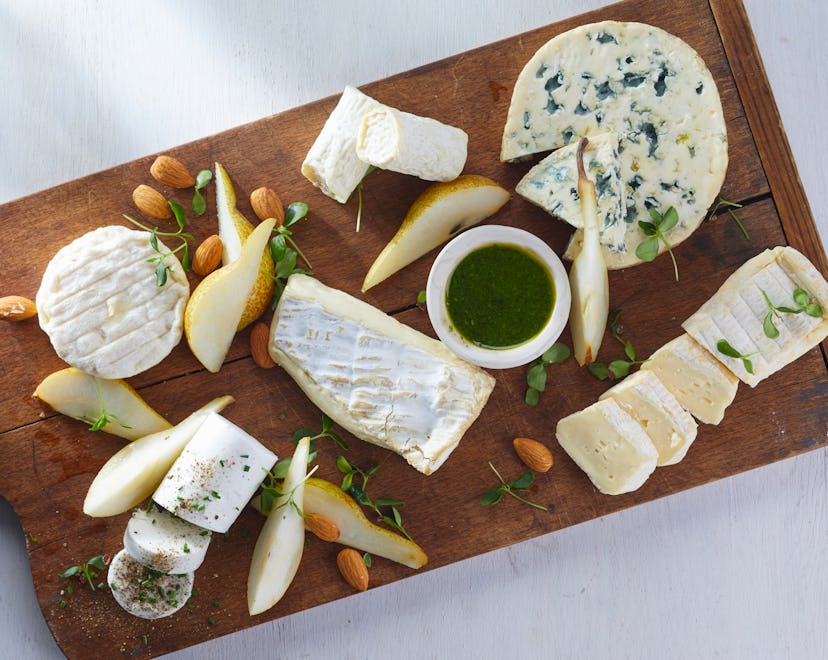Food

Are Soft Cheeses Safe During Pregnancy? Experts Explain
Unfortunately, some soft cheeses can carry harmful bacteria.
The list of things you can’t do or need to modify during pregnancy can feel lengthy and confusing. From deli meats to coffee consumption, trampoline jumping and hot tub soaking, the rules get blurry sometimes. You know alcohol is off limits, but what about your most beloved snack food? Can you eat soft cheeses during pregnancy? Before you reach across the charcuterie board for another bite of Brie, here’s what you need to know.
What are the risks of eating soft cheeses during pregnancy?
“Soft cheese gets its ‘softness’ from the high moisture content in the cheese. Unfortunately, this makes the cheese prime for the bacteria listeria to breed and multiply,” Dr. Neely Elisha, a board-certified obstetrician, tells Romper.
This type of bacteria can cause illness if consumed, especially when you’re pregnant. “Listeria is the bacteria that can grow in soft cheeses and is dangerous to pregnant women and the baby, and can result in miscarriage or premature birth,” obstetrician Dr. Kim Langdon tells Romper.
When a person consumes listeria in soft cheese or another type of food, they can get an infection called listeriosis. According to Elisha, pregnant women can experience mild flu-like symptoms, abdominal or back pain, nausea, vomiting, or diarrhea from listeriosis, but the impacts to a fetus can be life-threatening.
“These symptoms may manifest as much as two months after having been infected with the listeria bacterium. However, the woman may not experience any symptoms at all. While the symptoms in the pregnant woman are mild, infections in the fetus or newborn baby can be severe,” Elisha stresses. She also notes that preterm labor could result, or you could lose your baby before they are born. The baby could also be born seriously ill with meningitis or sepsis and pass away after birth from the infection.
Doula and birth expert Sara Lyon tells Romper that when it comes to listeria, “It’s important to note that soft cheese isn’t the only potential carrier; other foods like deli meat and sprouts, as well as lesser recognized foods like eggs, raw fruits and vegetables are also potential carriers.” She implores pregnant moms to do their research before consuming foods that can potentially carry listeria.
Can you eat any soft cheeses during pregnancy?
The official recommendation from the Centers for Disease Control and Prevention (CDC) is that pregnant women should avoid soft cheeses made with unpasteurized milk and only purchase soft cheeses with the word “pasteurized” on the label. This means that most types of cream cheese, cottage cheese, and mozzarella, though soft in nature, are OK as long as they’re pasteurized. (Go ahead and smear that bagel, y’all.)
Blue-veined cheeses are one group of soft cheeses that Elisha specifically cautions women to avoid during pregnancy. “To avoid getting listeriosis during pregnancy, you should not eat any soft blue-veined cheeses such as Danish blue or gorgonzola. These cheeses are made with mold and can contain listeria,” Elisha tells Romper. “Other soft cheeses such as brie, camembert, roquefort, and feta, and Mexican cheeses like queso blanco and queso fresco also should not be eaten.”
In general, experts agree with the CDC’s recommendation, though some urge expectant parents to take an even more conservative approach when choosing soft cheeses due to the potential risks involved. As always, if you aren’t sure what foods you should or shouldn’t consume during pregnancy, your personal doctor or healthcare provider is the best guide.
How can you know which cheeses are safe to eat during pregnancy?
“Non-soft cheese and those that that are made with pasteurized milk are safe to eat during pregnancy,” Elisha tells Romper. So if you do get a craving for cheese, Swiss, cheddar, and gouda are all solid, safe options.
But how can expectant moms know whether their favorite cheeses fall into this category? Simply put: check the label.
“If you’re purchasing cheese from a mainstream supermarket, it will probably be well marked with the contents, including pasteurized vs. unpasteurized milk. If you’re buying from a shop that’s staffed with cheese mongers, simply ask them for guidance,” Lyon recommends. “Never be afraid to appear any type-of-way. You won’t enjoy the cheese if you’re eating it worried about the consequences, so get the info!”
Experts:
Dr. Neely Elisha, D.O., board-certified OB-GYN at Inspira Health
Dr. Kim Langdon, OB-GYN with Medzino
Sara Lyon, birthing expert, doula, author of The Birth Deck and You’ve Got This: Your Guide to Getting Comfortable with Labor
This article was originally published on